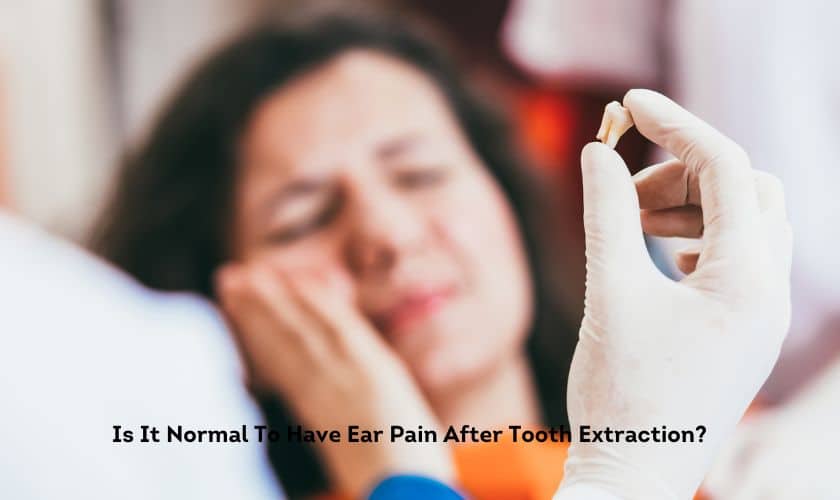Tooth extractions are a common dental procedure, often necessary for removing damaged, impacted, or infected teeth. While the extraction itself might be uncomfortable, most people expect the biggest discomfort to be at the extraction site itself. However, it’s not uncommon to experience ear pain after a tooth extraction. This can be surprising and unsettling, but fret not! In many cases, ear pain after tooth extraction is a normal part of the healing process.
This blog post will delve into the world of tooth extractions and ear pain. We’ll explore the reasons why you might experience this discomfort, how to manage it effectively, and when to seek professional help from your dentist.
Understanding Tooth Extraction and Ear Pain
Our head and face are intricate networks of nerves, muscles, and bones. The trigeminal nerve, for instance, is responsible for sensation in our teeth, jaw, and even parts of our face and scalp. This interconnectedness means that irritation or inflammation in one area can sometimes radiate pain to seemingly unrelated areas.
During a tooth extraction, your dentist will numb the area with local anesthesia. However, the extraction process itself can cause inflammation and irritation in the surrounding tissues. This inflammation can put pressure on the trigeminal nerve, leading to referred pain in your ear, even though the source of the discomfort is in your mouth.
Common Causes of Ear Pain After Tooth Extraction
There are several reasons why you might experience ear pain after a tooth extraction. Here’s a breakdown of the most common culprits:
- Inflammation: As mentioned earlier, inflammation around the extraction site is a natural part of the healing process. This swelling can put pressure on nearby nerves, causing referred pain in your ear.
- Radiating Pain: The trigeminal nerve branches out to innervate your teeth, jaw, and even parts of your ear. When this nerve is irritated due to the extraction, you might feel pain in your ear even though the source is in your mouth.
- Sinus Issues: Our sinuses are located near the upper back teeth. Sometimes, swelling after a tooth extraction can extend to the sinuses, causing congestion and pain that can radiate to the ear.
- Dry socket: This is a complication that can occur after a tooth extraction, especially for lower back teeth. When the blood clot protecting the exposed bone gets dislodged, it can lead to pain that radiates to the ear.
- Nerve Damage: In rare cases, nerve damage during the extraction can cause persistent pain that might radiate to the ear.
How to Manage Ear Pain After Tooth Extraction
In most cases, ear pain after a tooth extraction is temporary and resolves on its own within a few days as the swelling subsides. Here are some tips to manage the discomfort:
-
Pain Medication: Over-the-counter pain relievers like ibuprofen or acetaminophen can help reduce inflammation and alleviate ear pain. Take them as directed by the manufacturer or your dentist.
-
Cold Compress: Apply a cold compress wrapped in a thin towel to the outside of your cheek near the extraction site. The cold helps reduce inflammation and numb the area, providing relief from ear pain.
-
Rest: Allow your body ample time to heal. Avoid strenuous activity and get plenty of sleep to promote healing and reduce inflammation.
-
Elevation: Keep your head elevated while sleeping or resting. This helps reduce swelling and minimize pressure buildup at the extraction site, which can lessen ear pain.
-
Oral Hygiene: Maintain good oral hygiene by gently brushing and flossing your teeth (avoiding the extraction site) to prevent infection, which can worsen pain.
When to See a Dentist
While ear pain after tooth extraction is often temporary, there are situations where it’s best to consult your dentist:
- Severe or Persistent Pain: If the ear pain is severe, persistent, or worsens over time, despite following home remedies, see your dentist.2.
- Fever: A fever along with ear pain could indicate an infection, requiring immediate dental attention.
- Bleeding: Excessive or prolonged bleeding from the extraction site warrants a visit to your dentist.
- Bad Breath: A foul odor coming from your mouth could be a sign of infection, requiring professional intervention.
- Numbness: While temporary numbness is normal after an extraction, persistent numbness can indicate nerve damage and needs a dentist’s evaluation.
Ear pain after tooth extraction may seem perplexing at first glance, but understanding the underlying mechanisms can provide clarity and reassurance. By recognizing the intricate connection between dental procedures and referred pain, individuals can take proactive steps to manage discomfort and promote healing effectively. Remember, while ear pain following tooth extraction is not uncommon, consulting with your dentist can provide personalized guidance and support tailored to your specific needs.
